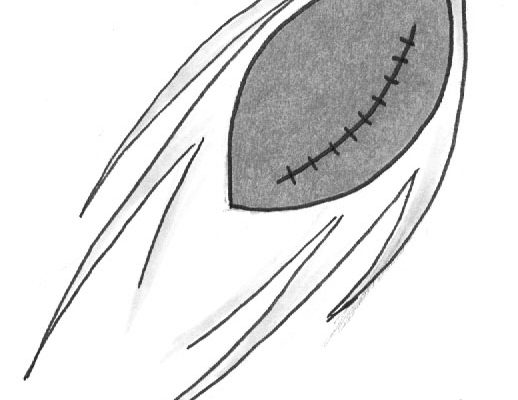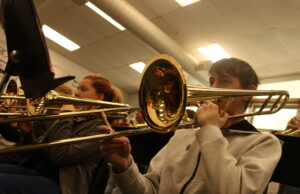Fantasy Football life: Students and teachers invest their time into popular game

The television screen blares noisily as the viewers sit forward in their seats breathlessly, watching. They are all apart of a fantasy football league, and this is the last game of the week. It’s the fourth quarter of the Green Bay Packers against the Detroit Lions, with only five seconds to go. 5. 4. 3. 2. 1- and the Packers lose! While most of the fantasy players groan and slump back, one jumps up, ecstatically.
Despite the name “fantasy football,” the game is all about how actual football players play during the season. It is an online competition where players act as sports managers, drafting NFL players from different teams in hoping to create the best team in their league, or their dream team.
However, it’s not as simple as it may seem. Many serious fantasy players study potential players for their team. “My friend, he literally typed up every single player he wanted to pick, and saw all the stats from last season,” Cameron Brown, senior football player, said
Even with all of the research that people do, according to Evan Milhaupt, junior, “it’s half skill, half luck.”
Robert Martin, science teacher, agrees with Milhaupt. Having played fantasy football since 2005, Martin feels that “it’s always so random. I feel like you can try so hard and read all the experts so much but ultimately they say ‘any given Sunday,’ anything could happen no matter what. So that’s the most frustrating part about it, just not putting in the guy who’s super good… I’ve won twice. But not because I’ve been getting better. It’s kind of just luck.”
Another side effect of playing fantasy is how addicting it can become. “It’s really addicting. Basically every weekend you have to decide who your line up is and it’s basically like if you’re managing an actual team,” Brown said.
Milhaupt, along with many other fantasy players, gets very invested in their teams. “I get a little emotional some weeks if the Green Bay Packers lose, and then if my fantasy team loses, and I lose money, that’ll put a little damper on my week.”
When playing fantasy football, sometimes team loyalties get divided. “You’re put in this weird situation when your favorite team is playing against your fantasy quarterback or something like that. And then you get confused about who to root for. And then also sometimes you end up rooting for players as opposed to teams… people feel like it makes it so that it’s a little bit less cool. So some people feel like it does take away from the ability to root for your team,” Martin said.
Fantasy football helps people discover more about different teams and different players. “It got me more interested in other teams, like matchups, so instead of just focusing on my one team, there’s 31 other teams with incredible players that I can look at, and that run all different sorts of plays,” Milhaupt said.
“It just helps you understand the better players and what strategies to use,” Brown said. He also enjoys “feeling like it’s my own team. I can play who I want, I can sit who I want, pick up who I want, and trade who I want. It’s a sense of like you’re in control.”
Fantasy is also a great way for people to make new friends. Brown has met some of his friends from the game.
Martin sees it as a great way to always be excited for all games. “I still think overall it makes football more enjoyable because it does allow you to be invested in all games… it’s nice because if it wasn’t for fantasy football sometimes that game on TV you don’t care about at all. Especially at the end of the year when two last place teams are playing each other. If you have fantasy football going on you could still be interested in that game.”
Fantasy football may not be for everyone, but “if you like football, if you actually watch it every weekend or so, it’s a great thing to do,” Brown said.
“It just brings you a lot closer to the group of people in your league, just because there’s a lot more communication that needs to go on between the opposing teams, but even if you just do it, just join a random league, there’s just that competitive aspect of winning,” Milhaupt said, “If you’re a competitive person it’s obviously going to be fun, but even if you’re not that competitive, just seeing points go up and how you stack up against, it’s just small learning strategies that I think is just helpful in life in general.”



